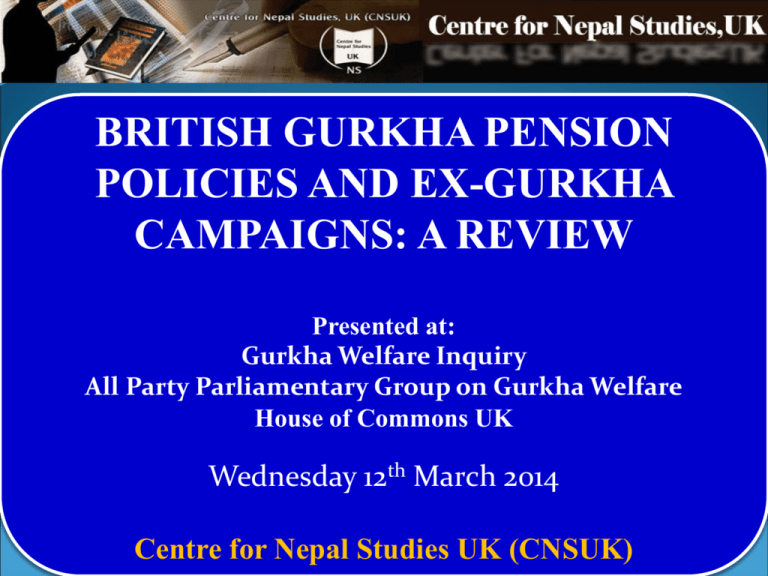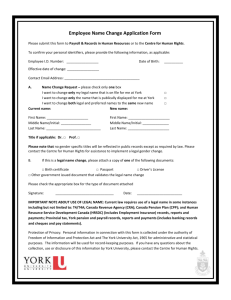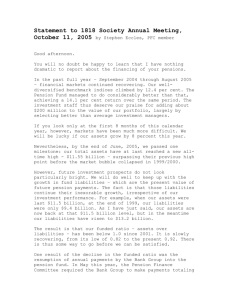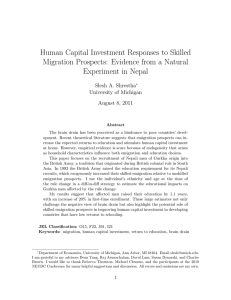BRITISH GURKHA PENSION POLICIES AND EX
advertisement

BRITISH GURKHA PENSION POLICIES AND EX-GURKHA CAMPAIGNS: A REVIEW Presented at: Gurkha Welfare Inquiry All Party Parliamentary Group on Gurkha Welfare House of Commons UK Wednesday 12th March 2014 Centre for Nepal Studies UK (CNSUK) Outline of the presentation Introduction (CNSUK and Gurkha Pension Report) Lokendra Dhakal Gurkhas and Pension Issues: An Overview Dr Chandra Laksamba Some important issues for consideration Dr Krishna Adhikari Way forward Prof. David Gellner Introduction (CNSUK and Gurkha Pension Report) Lokendra Dhakal Introduction to CNSUK CNSUK is registered in 2007 in England and Wales(Companies Act 1985) Motto: ‘Advancing knowledge on Nepalis’ Main research activities include: Population and Migration Ethnic Minorities and integration British Gurkha Religion and Culture Partnership with organisations and communities to promote research and bilateral interests between Nepal and the UK Centre for Nepal Studies UK (CNSUK) Contributors Dr Chandra Kumar Laksamba (CNSUK) (Team Leader) Dr Krishna Prasad Adhikari (CNSUK/University of Oxford) Mr Lokendra Purush Dhakal CNSUK) Professor David Gellner (University of Oxford) Why this report? Aim of the Reports is: 1. To provide information and background on the unresolved Gurkha pension issue; and 2. To assist participants in the debate to achieve a nuanced and balanced understanding that recognises the positions of diverse stakeholders, and thereby, to assist in the search for appropriate solutions. Methods • This is partly the result of two initial symposia followed by a series of interactions with Gurkha organisations operating in the UK, as well as with other stakeholders. • Review of existing treaties, court verdicts, and other literature on Gurkha issues. Gurkhas and Pension Issues: An Overview Dr Chandra Laksamba Historical Background “Bravest of the brave, most generous of the generous, never had a country more faithful friends than you” Sir Ralph Turner MC History: Huge participation • Recruitment began in July 1815 • In the First World War, there was a total of 20 Gurkha battalions with 120,000 Gurkha soldiers participating in the war. They comprised 2.12% of Nepal’s population. (The 16,000-strong Nepal Army was deployed to replace Indian Army for the frontline duty. Furthermore, the entire Nepal Army was placed on standby for the UK's disposal. ) • In the Second World War, out of a 6,283,649 population of Nepal, a total of 131,000 Nepali citizens were engaged as Gurkha soldiers in frontline action. History: Huge gains and losses • In two World Wars: 12 Victoria Cross (VC) including 4,700 bravery medals, commendation letters and certificates were awarded to Gurkhas. • 1 x VC awarded in the Borneo Confrontation in 1965. VC Kulbir Thapa – 1st World War • Total of 13 VCs awarded to Gurkhas. • But approximately 43,000 Gurkha soldiers were killed in action, thousands disappeared without any trace, suffered casualties, disabilities and war trauma. VC Tul Bahadur Pun – 2nd World War VC Ram Bahadur Limbu Since the separation from Indian Gorkhas in 1947, a total of 269 British Gurkha soldiers have been killed in active service. Among them: • 204 Gurkhas were killed in Malaysian Emergency, the highest number since the Second World War. • 59 were killed in the Borneo Confrontation, • 3 died in Hong Kong, • 2 died in the Falklands conflict and 1 in Bosnia. • In the ongoing Afghan war a total of 15 soldiers have been killed, 54 wounded, and more than 100 disabled. • Sugauli Treaty 1816 - the treaty covered neither recruitment policy nor the pay, pension, and welfare of Gurkha soldiers. • Indian independence, split of Gurkhas into Indian and British Forces • Bilateral and Tripartite Agreement (TPA) - incorporation of Indian Pay Code despite Nepal’s Observation and Suggestions. Major policies and changes GPS AFPS 1975 AFPS 2005 TPA 1947 GTACOS reviewed in 1955 GTACOS reviewed in 1981 GTACOS reviewed in 1996 Ministerial review 1999 Amendment to the Immigration Rules 2004 GTACOS reviewed in 2006 Gurkha Offer To Transfer (GOTT) 2007 Amendment in immigration rules in 2009 Gurkhas by pension status Pre-1948 retirees Mixed: GPS plus AFPS 75 280 25000 2,161 20000 15000 10000 5000 542 6,534 5000 Mixed: GPS plus AFPS 75 (Deferred until 60 due to less than 22 years service) Rtd btn 1 Apr. 1975 and 1 July 1997 Retired between 1948 and 1975 20,774 Pre-1948 retirees GPS Holders To apply AFPS 2005 (equal) 3,500 0 No pension With pension Serving Gurkhas by Pension Status and Type Ser ving Pensioners Non-pensioners Types Pre-1948 retirees Number Unknown (C. 5,000 in GWT) Retired between 1948 and 1975 6,534 Retired between 1 542 April 1975 and 1 July 1997 (with no service pension) Pension Welfare Charity Benefit (WCB) of £40/month (Selected, needs-based). WCB of £40/month (Selected, needs-based). WCB of £40/month (Selected, needs-based, total 3,438 people receive WCB). Remarks Not allowed to come to the UK. Allowed to settle in the UK with 4 years’ service. Not qualified for Preserved Pension that British get with at least 2 years’ service. Allowed to settle in the UK with 4 years’ service. Enlisted before 1 Oct. 20,774* GPS (Around Not allowed to transfer to 1993 and retired (incl. 6,870 £223/month for Riflemen AFPS. before 1 July 1997 widows)* with 15 years’ service). Allowed to settle in the UK. Enlisted before 1 Oct. 2,161 Stay in GPS until 60 and For the purpose of after 60 1993 and retired after (incl. 38 then switch to a mixed pensions, service until 1 July 1 July 1997 with less widows) regime of GPS and AFPS 1997 (actuarial) is counted than 22 years of 75. 23-36% only. service Enlisted before 1 Oct. 280 Allowed to transfer from Service until 1 July 1997 1993 and retired after (incl. 10 the GPS to AFPS 75 (actuarial) is counted 23-36% 1 July 1997 with 22 or windows) (mixed regime). only. more years of service Enlisted since 1 3,500 AFPS 05 Full and equal pension and October 1993 pay (since 8 March 2007). Some Examples of Unequal Pensions and Benefits Table 3: Comparative pension scales in 1989 Rank British pension per Gurkha pension per Difference (%) annum annum WOI £5,269 £498 958% Captain £6,348 £606 948% Source: House of Commons (1989). The Defence Committee’s First Report on the Future of the Brigade of Gurkhas. Rapid rise in Gurkha pension in recent years Service credit for Gurkha soldiers’ service before 1 July 1997 Source: Pension Policy Instruction (2009: 25) Comparison of Pension per-annum in 2013 (in GBP) British and and Commonwealth Veterans WO2 in AFPS 1975 after 22 years service: Gurkha WO2 in GPS/AFPS (enlisted before 1 October 1993 and retired in 2006 (after 1997) after 22 years service: Gurkha WO2 in GPS (enlisted before 1 October 1993 and retired before 1 July 1997) after 22 years service £12,909.00 £6,840.00 £4,043.16 Other Comparisons British Gurkha Terminal grant 1n 1989 (WOI with 22 £15,807 years services) 0 Death cum Retirement Gratuity and Resettlement grant (WOI with 22 years services in 1989) 0 £4,292.84 Preserved pension at the age of 60 (now 65) for service above 2 years Yes No War disablement pension Available Not available National insurance Charged and welfare benefits given Charged but welfare benefits not entitled Large number of redundant Gurkhas in the1960s and early 1970s with 4-9 years service received £300-360 one-off payments, which was several times less than what their Commonwealth counterparts had received. Other Comparisons GPS pensioners: It is important also to note that the terminal grant paid as part of the transfer would not be available. This is because the GPS pensioners received their tax-free lump sum when they left the Army, and the UK tax rules do not allow the payment of another tax-free lump sum. (Source: Gurkha Offer to Transfer (GOTT) Hand Book page 27.) Rise of Ex-Gurkha Organisations Summary of court cases related to Gurkha pensions Claimant Filed Filed at Main claim s Year (Court) Decision Hari Bahadur Thapa Gyanraj Rai 1998 Not qualified for full pension, as 80% service was outside UK because joined the Army as Gurkha. GAESO (P. Gurung, G. Thapa, H. Pun) GAESO (Purja case) 2002 Born in the UK, joined British Gurkha and became a UK citizen but discriminated on a pension (Racial discrimination). Supreme Issue a ‘Court Order’ to GoN to review the TPA. The Court of clause ‘Indian Pay Code’ of the TPA has discriminated Nepal against Gurkhas’ pay and pensions and should be nullified. High Compensation for Japanese Prisoners of War (POW) Court, UK (amount already received from Japan by the UK Government for all in British India Armed Forces). High and Appellate Courts, UK High Court, UK Equal pay, pension, and welfare (on a par with Commonwealth citizens and British counterparts). Due to an expectation to discharge in Nepal, the issue of equality not applicable. No party is a winner; but need to settle by mutually recognising each other’s positions. Case was not allowed – a weak starting point for an assertion of indirect discrimination on age grounds. High Court, UK High and Appellate Courts, UK Settlement for all Gurkhas. Granted (with 4 years or more service). Allow all to transfer of pension from GPS to AFPS, and count the service on a year-for-year basis for those on such transfer. The High Court verdict stated: “Disinclined to grant any relief by reason of delay” and referred to section 31(6) of the Senior Courts Act 1981 and the detriment to good administration.* The Court of Appeal dismisses the application for judicial review. ECtHR The significantly lower pension entitlement of Gurkhas On-going retired or having served before 1 July 1997 amounts to differential treatment on the basis of nationality, race and age, and is in violation of the ECHR. 2000 2002 K. Shrestha, 2008 K. Purja, S. Gurung GAESO 2008 BGWS 2009 BGWS (On-going) 2011 Tribunal, UK The applicants alleged that they were discriminated against in their entitlement to an Army pension on the basis of their age and/or nationality. Case dismissed citing that the nature of the case was beyond the boundary of the country’s constitutional and legal ground. Granted. The ex-Gurkhas would receive "ex-gratia" payments of £10,000 each from a fund set up to benefit the British POWs. Some important issues for consideration Dr Krishna Adhikari The UK Government’s Position Gurkha soldiers are fairly treated (in some case even better than the British) (Immediate pension in 15 years vs 22 years of British soldiers) Welfare and charity supports Pensions cannot be changed retrospectively (implications will be huge, affecting millions) The cost of changing Gurkha pensions will be huge (and unnecessary) Gurkhas in the UK are paid means-tested benefits (pension credit and housing benefits) Five Key Issues: • • • • • Fundamental Human Rights Changed context: ‘Legal’ and ‘fair’ vs ‘legal’ and ‘equal’ Cost implications: myths and realities Internationally comparable cases: UK lags behind TPA needs updating on bilateral basis The UK’s commitment to human rights The United Nations Declaration on Human Rights Article 23 (b): “Everyone, without any discrimination, has the right to equal pay for equal work.” ECHR 1950, Article 1, states: And the Article 14 states: The enjoyment of the rights and freedoms set forth in this Convention shall be secured without discrimination on any ground such as sex, race, colour, language, religion, political or other opinion, national or social origin, association with a national minority, property, birth or other status. ILO Equal Remuneration Convention (100) : ‘equal pay for equal job’s, and ‘equal pay for jobs of equal value’. The Changed Context “The Gurkha Pension Scheme (GPS) is a very fair scheme” Kevan Jones, MP, the Under Secretary of State for Defence, 16 July 2009 Gurkhas receive double payment: as per IPC and top ups. ... It is fairer for the quality of life in Nepal. ...Gurkha benefits are designed for Gurkhas to be recruited and to retire in Nepal. “... public interest to remedy an historic injustice in the UK Government’s previous treatment of Gurkha veterans.” [2013] EWCA CIV 8, Para 115. 48 Most ex-Gurkhas are lawful residents in the UK Currently serving Gurkhas’ benefits are equalised 30000 25000 Number of Gurkha Pensioners (between 1997 and 2011) 20000 15000 10000 5000 0 1997 1998 1999 2000 2001 2002 2003 2004 2005 2006 2007 2008 2009 2010 2011 Pensioners Widows Total Source: Gurkha Manning and Records Office, 2011) Linear (Total) Costs associated with an elderly ex-Gurkha couple living in Aldershot (rough estimates, June 2013) in GBP Local Housing Allowance (1-bedroom flat) Council Tax Benefit Pension Credit Winter Heating Allowance Bus Passes (estimated value) NHS and Social Care (difficult to estimate) Total (per annum) 7,200.00 1,116.00 11,520.00 200.00 840.00 11,700.00 32,676.00 Is the UK lagging behind? India’s equal treatment to Gurkhas Change of French policies towards its foreign veterans USA’s treatment of Filipino veterans Tripartite Agreement The TPA controversy: 1. Illegal 2. Legal but irrelevant 3. Perfect Compendium of various documents, bipartite and tripartite agreements, observations and suggestions, and responses Bilateral agreement between UK and India “the basic rates of pay admissible to Gurkha Officers and soldiers serving HM Government shall approximate to those laid down in the present Indian Pay Code ...” (TPA 1947, Annexure I, Section C, Article 11). Nepal Government’s Suggestions In all matters of promotion, welfare and other facilities the Gurkha troops should be treated on same footing as other units in the parent army so that the stigma of ‘mercenary troops’ may for all time be wiped out. (TPA 1947, Annexure III, Section G, Article 1) Response of British Government In his letter to the Maharaja of Nepal dated 7th November, the terms of which were acknowledged and confirmed by the Maharaja on the 9th November, Mr Symon made clear that “subject to the limitations of finance and supply, welfare facilities would be provided for Gurkha troops on similar lines to those provided to British (United Kingdom) troops”... that the United Kingdom Government in no way regarded Gurkha troops as mercenaries, and they would form an integral and distinguished part of the British Army. (TPA 1947, Annexure III, ection H, Footnote 1) The way forward Prof David Gellner THE WAY FORWARD Gurkha pensions and welfare policies need to be made compatible with those of the parent British Army by: 1. discarding GPS as it currently operates and upgrading it in line with AFPS 75, or allowing all GPS pensioners to opt for AFPS 75; 2. discarding the 23-36% proportions of service prior to 1 July 1997 for AFPS 75, and accepting them on a year-for-year basis; 3. entitling all non-pensioners retired after 1 April 1975 with over 2 years of service to receive the Preserved Pension at the age of 60; 4. providing all non-pensioners who were redundant before 1 April 1975 with a monthly subsistence allowance to bring their standard of living to the same level as British veterans who left the British Army with no Service Pensions, but who are nevertheless eligible for Department for Work and Pensions (DWP) benefits; and, 5. abrogating the TPA and signing a bipartite UK-Nepal agreement to reflect the unique circumstances of the British Gurkhas and the changed context of British Gurkhas’ service There are two further important points with regard to pay and pensions: • The UK Government should acknowledge that Gurkhas were not always treated equally in the past and that such inequality has been rectified for serving Gurkhas since 8th March 2007; • Demands for retrospective compensation may well have a considerable degree of legitimacy and ways need to be found to address the issue. Thank you Q &A








